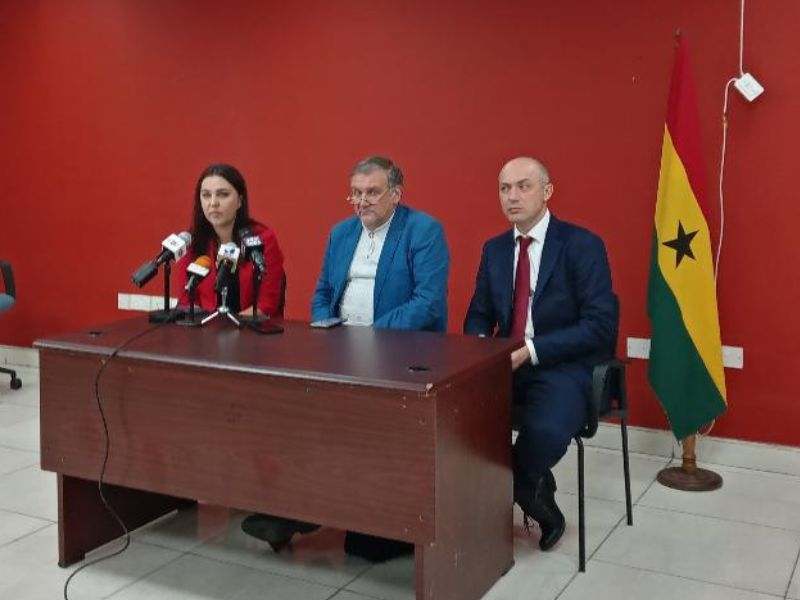A high-level civil delegation from Ukraine has visited Ghana to court the West African country’s support against Russia, which has invaded their state.
The members of the delegation are Oleg Nivievsky, Vice President of Economic Education and Associate Member at the Centre for Food and Land Use Research, Dr. Olexiy Haran, a Professor of Political Science at the National University of Kyiv Mohyla Academy (UKMA), and Tetiana Pechonchyk, Head of Board, ZMINA – Information Centre for Human Rights.
The delegation visited Ghana as part of awareness creation and to influence political figures, as well as civil society organisations, about the Russian invasion, and the implications on global food security, energy, and economic security.
The delegation at a news conference in Accra on Monday, told journalists that Africa could not distance itself from the war that Russian President Vladimir Putin had been waging in Ukraine, since February 24, this year.
Mr. Nivievsky said Africa must join the call to put pressure on Mr. Putin to withdraw his troops from Ukraine, secure the grains corridor, secure nuclear safety, and respect international law on human rights, especially the Geneva Convention.
According to him, Mr. Putin was violating international law, all in the name of restoring the defunct Soviet Union or the Russian Empire.
“Russia wants to restore the Soviet Union. When he started the full-scale invasion, he openly stated that he will like to change the government in Kyiv, control Kyiv, and transform Ukraine.
Meanwhile, Kyiv is 500 years older than Moscow. Historically, Ukraine is much older than Russia. Why should we lose our sense of being Ukrainians? Moscow is not being bombarded, but Kyiv is being bombarded…”
Dr. Haran added that Africa must mount pressure on Russia to stop the war to prevent the crisis from escalating into a full-blown nuclear catastrophe. “When there is a nuclear catastrophe; huge areas of land would be contaminated. The whole Ukrainian soil would be contaminated and human rights would be violated.”
Due to the impact of the war on global security, Africans were charged not to live in isolation and watch the crisis in Ukraine to rage on. Already, the delegation’s interaction with some rice farmers at Akatsi South revealed that the crisis had shot the cost of fertiliser up by 500%.
Haran argued that the war, if not stopped, may further compound the living conditions of Africans, whereas “if people live in poor conditions, it is a threat to government and state security. Poor people mean more insecurity; more distress to the government and the environment,” he added.
Failure on the part of Africa, he said, would mean the breakdown of the secured food chain, freezing of grain and fertiliser export from Ukraine, and nuclear safety.
Ms. Pechonchyk debunked what she described as misinformation by Russian propaganda machinery that blacks were being targeted and discriminated against by Ukrainians at the start of the war.
She said the issue was being investigated by human rights organisations to establish facts leading to those pockets of incidents against black people in Ukraine.
Nevertheless, she said, the Ukrainian government had ensured that foreign nationals were given the needed assistance, including shelter and food.
According to her, about 40 million Ukrainians had been forced from their homes, making the crisis one of the global catastrophes since World War II, which must be condemned in no uncertain terms.
The visit
The team, therefore, looked forward to increasing ties with Ghana, particularly in the exchange of expertise and equipment to improve agricultural productivity.
They will also hold meetings with ministers of state, political heads, commercial groups, academia, and civil society organisations to discuss the horror in Ukraine caused by Putin’s invasion.










